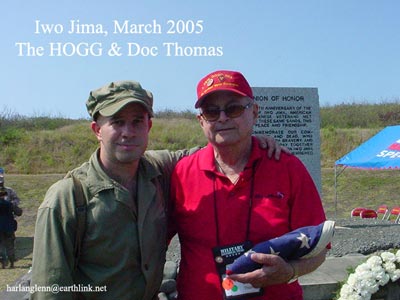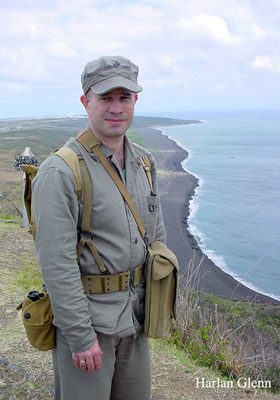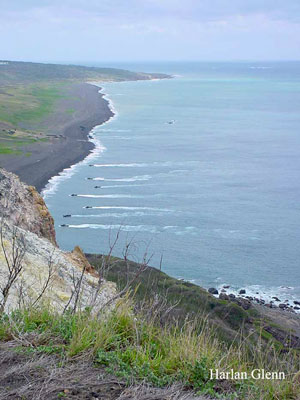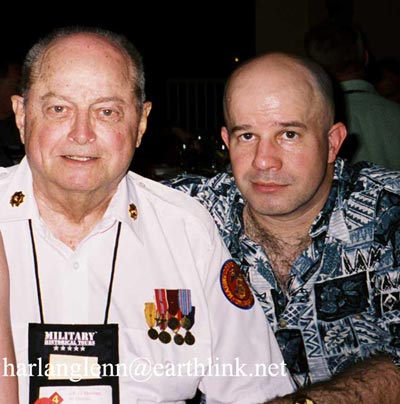In memory: Danny Thomas, US Navy Corpsmen passed away on New Year's Day 2007
Of all the Pacific War battlefields Iwo Jima has to be the most
significant and at the same time-the hardest to get to. While it
holds the same type of meaning to Americans as Gettysburg, Iwo Jima
is not a place that you can hop in the car and make a road trip to.
Iwo Jima is in the middle of nowhere and due to an agreement between
the American and Japanese government, we and the Japanese can only
return but once a year to visit and remember those who fought and
died there some 60 years ago.
Each year, in the month of March, the island of Iwo Jima
is open to visitation by American and Japanese veterans and family
members, and a handful of “enthusiasts”. It is a short
day and over before you know it! Americans leave the island of Guam
at about 0800am and arrive on the island at about 09:30am.
As soon as you hit the ground you are welcomed by a Marine contingent
from Okinawa, who support the pilgrimage each year. From there you
are shuttled to a memorial service where both Japanese and American
veterans and officials speak and offer remarks about the battle and
those who took part. Once the ceremony is over-you are free to roam
and explore the island.
Iwo is like many other hard to get and less traveled
islands in that it is a time capsule, with areas of the island
still strewn with battle debris, from pieces of shrapnel on the beach
to shell casings and bullet ridden canteens in the tunnels and bunkers.
Much of the island is now overgrown and looks nothing like it did
in 1945. But there are other areas that are as they were during
the battle-where the ground is so harsh that no plant life can grow
and remains scared from the hells of that 30+ day campaign.
This
year, this trip was very special for me, as I was able to make an
old veteran very happy. Since the war, in fact since the very day
that he stormed ashore with his Marines of the 23rd Regiment, 4th
Marine Division, Danny Thomas a Navy Corpsman has been haunted by
the visions of what he saw that fated day of February 19th, 1945.
As soon as the ramp went down on his Higgins boat, Danny and his
best buddy Chick, also a Navy Corpsman ran ashore with their platoon
of Marines. No sooner did their Boondockers hit that black sand-than
did Danny’s pal Chick were blown in half with his intestines
strewn across the beach before his very eyes. After Danny finished
vomiting up his toenails, he went into auto pilot and began treating
wounded and dying Marines on the beach.
For the next two weeks Danny followed his Marines inland and into
some of the “hottest” enemy held strong points found
on the island, places like The East Boat Basin, The Quarry, The Meat
Grinder, The Amphitheater, and here in these places the 4th Marine
Division were whittled down to a fraction of their original strength-and
all the while Corpsmen like Danny did their best to try and patch
them up and keep them alive.
Somewhere from the time Danny left the beach to the time he left
the island he earned a Bronze Star-yet he can’t tell you how-as
he blacked out-as things were so terrible that it was all he could
do that survive-and that was the go into auto-pilot, as he was trained
and do his job. He was to forget what he saw and what he found and
just keep on going until it all stopped. And here is where poor Danny’s
problem began…his nightmare never stopped! For years after
the battle and war had long ended, Danny was haunted by the ghosts
of Iwo Jima. Every night he would awake in a cold sweat and could
smell the rotting flesh and burnt cordite. Each and every night he
would see the faces of his friends and of the wounded Marines and
dead and decaying Japanese.
I met Danny in 2002, on my first pilgrimage to Iwo Jima, and was
so taken by his persona that we became fast friends-as he is the
sweetest and most endearing soul that one could ever meet. After
we had returned from our trip in 2002, Danny had said to me that
he’d like to go back for the 60th anniversary-as his last and
final trip-to say goodbye to the ghosts and make peace with the dead-in
hopes that they would allow him to live his final years in a more
tranquil environment. And so our plan was made to return to Iwo for
the 60th, but with one stipulation, that I accompany him and look
after him-he did not have to ask-it was a gut feeling and request
from his guardian angles that I go with him-as if I did not-he might
no go and forever be tortured.
So as we began our trip back to Iwo in 2005, from the very first
night of the 10 day pilgrimage, it was with great pride and environment
that I looked after Danny-as if I were his personal valet. And all
along the way I knew that this may well be the last time I see Danny,
and that I had to ensure that he were treated like a King, as in
my mind he so deserved it for the care giving that he had unselfishly
distributed during the battle for Iwo Jima in 1945, 60 years ago.
To know Danny, one is taken with his simple and honest demeanor
from the get-go. He speak eloquently like a southern gentleman of
years long gone and only heard spoken while watching old films shot
in the 1930s and early 40’s. I do not think that this man has
a single enemy-as he is so likable and honest-much like that of
a saint. It is sad to think that such a sweet man has been tortured
for so long by the actions that took place over that short but hellish
period on Iwo Jima. When you think of a battle scars, Danny has them-yet
they are unseen and hidden and he does not openly display them-which
is much the way of the Pacific War veterans-they did their job and
if they survived they came home and got on with life as best the
could. One has to consider how many more “Danny’s” are
out there, secretly suffering and troubled by those days of yesteryear.
As time catches up with them-we will really never know how badly
many of our World War two veterans have suffered-and with each year
more and more pass away and many of them taking their stories with
them-to the grave.
Since meeting Danny in 2002, I have been to his home, driving there
to Irving Texas from Burbank California, and have sat in his den
with fireplace, in his old rocking chair and listened to his stories
of boot camp and hospital apprentice school, and of the shenanigans
that he and his fellow corpsmen got up to on the island of Maui,
where the 4th Marine Division trained and refitted for the Iwo Jima
operation (Camp Maui).
And the one thing or request that Danny has ever expressed was-that
when I told him that I was going back to Iwo in 2003, he asked me
to take his American flag with me and go to the top of the summit,
and hold it up and to have a picture taken of me-holding up his flag.
I agreed and was actually quite honored by his simple and humble
request.
So Danny sent me his brand new K-Mart nylon 50 star American Flag
and I took it with me on the plane to Iwo in 2003. As we approached
the island I took the folded flag from my carry on bag and tucked
it inside of the World War Two Marine utility jacket aka John Wayne
style, so when I got to the top of the summit-I could fulfill Danny’s
request. As a side note each time that I return to Iwo. I always go
in period military attire, head to toe! As soon as we touched down-we
were briefed by a Marine Corporal who said “There will be no
simulated Iwo Jima flag raising, there will be no acts of disrespect
to the Japanese-we are their guests, etc, etc”. Well that also
included holding up an American flag-as it might upset the Japanese.
I was instantly upset that I could not fulfill Danny’s request-and
when I returned and told him about it-he was aghast and furious…
In the course of our conversation, I asked Danny if he would like
to go back one last time-and he declined, saying that he was in ill
health and did not want to be a burden to anyone who might feel that
they had to take care of him and thus spoil their trip. At that point
I assured him that it would be an honor to accompany him and look
after him-and after a little arm bending-which took a few months,
and he agreed and so we would both go back for the 60th Anniversary
Iwo Jima 2005.
One has to question why holding up a flag meant so much to Danny
and others like him-yet I would have to say that to any WW2 Marine
Iwo Jima and its flag raising are a symbol that stands
for the entire Pacific war and those who took part in it. Mount Suribachi
and the flag raising (note that there were two flag raisings, yet
it is the 2nd of the two that became ”famous” through
still photography and motion picture) are like a badge of courage
and endearment for those who took part in the battle-though the flag
raising took place on D+4 of the 36 day battle, it is that one event
that they all remember and treasure, serving as a sign that they
would win and overcome the seemingly impossible.
Knowing what it meant to Danny, I planned a surprise and covert
mission to take place on the island and to be done in his honor,
I packed a WW2 48 star all cotton/muslin 54” x 28” American
flag in my carry on bag. And if opportunity presently itself, I would
climb the summit-using the original route as the 42 man patrol took
and, once atop the summit I would hold up said flag, for Danny, and
then present it to him later, at sometime that day on the island.
To get the original route, I called Col. David Severance (the rank
of Captain at the time of Iwo), who was with Lt. Col. Shepard who
sent up the 42 man patrol to scout the summit and raise a flag (54” x
28”) as a sign of conquest and defiance to the Japanese defenders
on the island. Col. Severance knew exactly how to get me there-giving
me specific directions from their landing beach-to go inland so far
and then turn left at a specific point and head up the summit between
two land mark rocks-and though paved road has been added to the summit
and some of the mountain has been blown and hacked away-it is still
possible to take the same route!
The night before we left for Iwo, many of those going met in the
hotel bar to share their plans and what Iwo meant to them and why
they were going. Though I was local I went down to see Danny and
spend some time with him-prior to leaving the next day. This was
the first time I had seen him since 2002 and he was glad to see me
as I was him. I did not mention a word of my “covert” plan,
rather we talked of how he had been and what he wanted to do during
the trip-and for Danny the 10 day trip was unimportant, it was only
that one day that mattered and he focused on it and said how this
time he was going back to say good bye to his buddies who had been
killed there and to make peace with the ghosts-doing all that he
had and could to knowing that this was indeed his last trip-I can
only guess that even as we sat in the bar-he prepared mentally for
that special day.
I have to revert back to 2002, as the morning that we all left the
hotel on Guam to go to Iwo, both my buddy (Dan King) and I were dressed
in full M1941 Marine Corps utilities and 782 gear-head to toe, and
the moment we got off the elevator all those in the lobby turned
to stare, most with approving and proud eyes and a few with eyes
of disapproval for fear of upsetting the Japanese, but one individual
was stunned…Danny! Danny saw us from across the room and his
mouth dropped to the floor. As we approached him he smiled and he
put his arms around us and confided that for a moment he thought
we were both friends of his that he had lost during the battle-that
for one moment he was taken back and had to reality check himself…this
short and small incident shows you how affected Danny is from those
fateful 36 days on Iwo of 1945.
The day before Iwo on Guam, 2005, the show Mail Call were interviewing
veterans for their Iwo Jima TV special. And as I worked for them
as an independent, I had been trying to get them to do a segment
of Navy Corpsman since the series started in 2002, and now in 2005
they had given in to “Harlan” pressure, and were also
to interview Danny about his experiences and what it meant to “Go
Back”. During the corse of Danny’s interview he had the
entire crew, myself included, in tears! Danny held back noting and
told how he got into the Corpsman Corps and how he was transferred
to the FMF (Fleet Marine Force) and how he ended up on Iwo and what
happened…the most traumatic part of his story was when he
spoke of D-Day (“Invasion Day”, the term D-Day is not
limited to the invasion of Normandy June 6th 1944, rather it was
used by the Army, Navy and Marines to signify the day on which a
operation was the commence). Danny went on to tell how he ran down
the ramp and saw he best buddy buried up to his waist-and how when
Danny turned around to see if his buddy Chick was following him-he
saw the rest of Chick…with Chicks intestines splattered all
over the beach and his legs nowhere to be seen, Chick had been blown
apart by a mortar and Danny had just found him as he gave his last
gaping stare and the life left his decapitated body. Danny made light-in
his true old school gentlemanly way of how he “threw up his
toe nails” at the sight of Chick and as soon as he had no more
to throw up-he went into auto pilot an began doing Corpsman work-dressing
wounds and doing his best to save the lives of his fellow Marines.
This has been Danny’s most haunting memory; from the first
minute on the beach-to see his best friend blown apart and his internal
organs spread across the black sands of Yellow Beach 1, Iwo Jima.
Once Danny had finished his interview we were all silent, the drew
and I had worked together many times before, and this was the first
time that we had ever seen each other openly weep with tears streaming
down our cheeks-it was that moving and I know that none of us were
able to keep it in-even Danny cried, but I watched him and knew that
he was glad and he had shared his story as I had impressed upon him
before that when and if we ever got to do this interview-that he
could to hold back-and that he had to tell it all so all that watched
it would know what “he” saw and what it was like to be
a Navy Combat Corpsman. And Danny did just that-I was so proud of
him-it is hard to find the words to express that.
The next morning, we all gather in the lobby of the hotel-to gram
some “hot joe” (coffee) and get on a bus that will take
us to the airport –to the plane-that will take us to the fated
island of Iwo Jima. And in the lobby I made my way to Danny who was
quite and as usual on his own-not being one to travel in groups or
in “packs”. He made a complimentary remark about my attire,
thought is time he did not have a flashback-he was relaxed and smiling
and seemed quite happy-he KNEW that this was his last trip and he
was to savor each minute-letting no part of it escape him and his
memory vault.
This year, for the 60th, there were 3 planeloads of “pilgrims” as
usually there is but one plane. And Danny did not travel on the same
plane as I, when we landed we made out way to the beach to begin
shooting “Mail Call” with the Gunny. Hours later the
crews were to go atop the summit to shoot some “stand-ups” from
the mountain-looking down onto the landing beaches.
At that point
I knew that THIS was my moment of opportunity! I acted quickly and
with the accompaniment of a fellow historian, Fletcher Isacks, who
had happened to be there on the beach, spreading the ashes of a family
member, I looked to him and he at me-and by some form of mental telepathy-we
said to each other-let’s go! And up we went-and I must tell
you that out respect and admiration for those who made the original
climb grew as we made our way through the brush and up the mountain.
Thinking that they were the ages of 19 to 20 and were both double
that-our climb was enduring. Each time that we grabbed a hold of
a brush op root-it would give way and break loose from its surrounding
earth-forcing us to keep a steady and quicker pace or fall backwards
and down the mountain. As we rose near the summit we heard chanting,
which turned out to be Teddy Draper, a 5th Division Navajo Code Talker.
Draper was “singing” a cleansing song for the dead, and
as we got closer to the top of the summit his songs increased in
volume-and gave us a kind or inspirational inner strength to keep
going and not slow down. As we got to the top we were beat (more
so I than Fletcher). We had done it-we had climbed the summit as
they did on February 23rd, 1945.
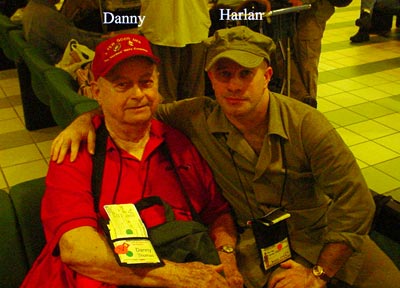


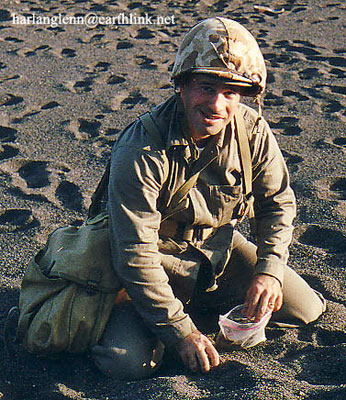
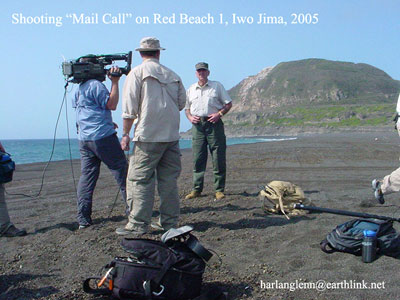


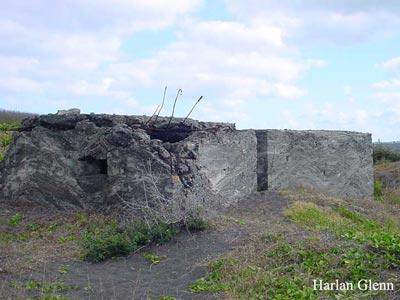
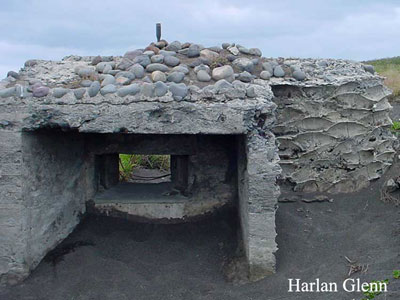
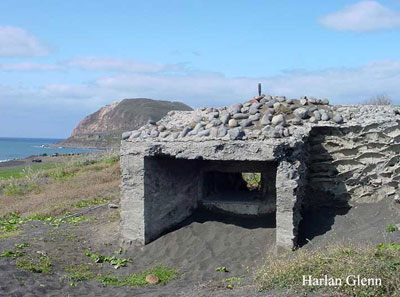
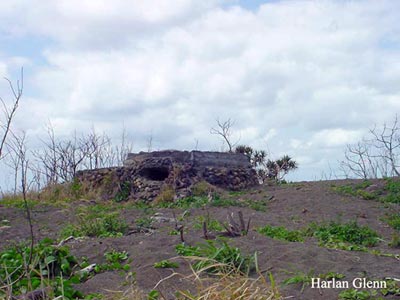

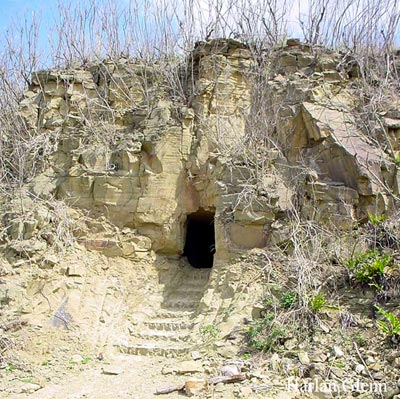

|















